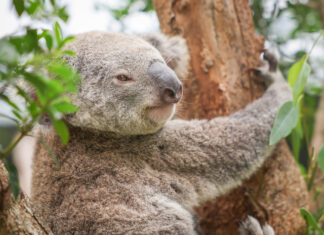Bat Rescue Inc is asking people to be on the lookout for baby flying foxes found distressed and alone during this baby season.
Bat Rescue education officer Jeannie Campbell said flying foxes (or fruitbats as they are commonly called) were Australia’s most important pollinators and seed dispersers and vital to the health and regeneration of native forests due to their transportation of pollen and seeds over large distances.
Grey-headed and Black Flying-foxes, two species found in south east Queensland, give birth to a single baby from late September onwards.
“The flightless and totally dependent baby clings constantly to its mother for milk and warmth during the first few weeks even when she flies out each night to feed,“ Jeannie said.
“Accidents occur during these expeditions, resulting in the baby becoming separated or orphaned.
“An easy meal in backyard fruit trees is very tempting to a mother flying-fox when carrying the burden of a growing baby. Unfortunately, getting caught in tree netting or attacked by domestic pets can be the result.
“Barbed wire is also a hazard for bats.
“Flying-foxes sometimes hang on an overhead powerline to rest. They can then be electrocuted when their wings touch other wires. But whilst electrocution is generally fatal for a mother, her baby often survives. The baby can remain hidden under her wings to die slowly from starvation or fly strike.“
Bat Rescue Inc is a volunteer organisation based on the Sunshine Coast that rescues sick, injured and orphaned flying-foxes as well as microbats, providing a free 24/7 community service.
If you find a bat on the ground, alone in a tree, caught in fruit tree netting, hanging on powerlines or injured in any way, contact Bat Rescue Inc. on 5441 6200 (24 hr hotline via WILVOS).
“And don’t forget, a very small percentage of bats can carry a rabies-related virus. Whilst this can only be transmitted to humans through a bite or deep scratch, please do not touch a bat in distress,“ Jeannie said.
For more information, visit batrescue.org.au









